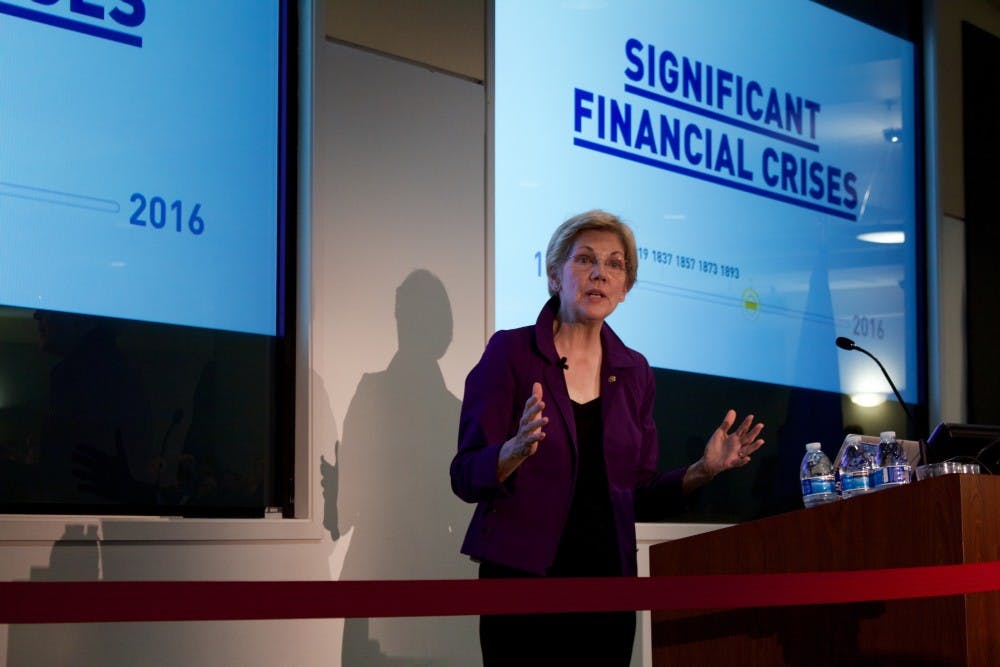With over 400 people in attendance, U.S. Senator Elizabeth Warren (D-MA) spoke to a full house on Wednesday about America’s current economic struggles and opportunities for improvement at an event co-hosted by the AU School of Public Affairs and the Kennedy Political Union.
In the midst of an election year where voters will choose a presidential candidate they feel best represents their interests, Warren said she wanted to go around and educate different groups of people on the current economic climate in the United States, including college students falling increasingly in debt from taking on financial loans.
“This is an experiment that we’re doing here,” Warren said. “This is an opportunity to talk about something a little longer, a little more, and it develops off actually the work I did as an academic, off of my teaching. Only back then I had these really horrible slides and I had to act out the various parts of it.”
Prior to the beginning of her speech, Jamie Raskin, a professor at AU’s Washington College of Law and a current state senator from Maryland’s 20th district, introduced Warren, referencing her financial expertise and professional achievements.
“She is the undisputed master of the questions of finance and money economics that go to the heart of American inequality today,” Raskin said. “She is the indispensable senator.”
To start off her presentation, Warren shared information about her upbringing with audience members. She discussed growing up in a family on the lower edge of the middle class, with a father who worked as a maintenance man, a mother who worked a minimum wage job answering phones at Sears, and three older brothers.
Warren said situations and stories like these among middle and lower class families are common today, and will continue to prevail unless an intervention is made.
“For a lot of families, no matter how hard they work, no matter how many coupons they cut, no matter how hard they try to save, there is never enough to make ends meet,” Warren said. “And none of this will get any better unless we make some fundamental changes in this country.”
She explained that despite indicators suggesting that the American economy is currently thriving, this economic growth comes at a price.
“Today, many corporations are reporting record profits,” Warren said. “The stock market is booming. Inflation is low. Unemployment has dropped below five percent. All of the official markers of a healthy economy are there. It looks great, but the question is ‘Great for whom?’”
With bankruptcy rates rising and debt levels increasing, Warren made it clear that this economic growth comes at the expense of the American middle class. This topic then drove the conversation throughout the rest of the evening.
“How did families pick up so much debt? How did they get squeezed so hard?” Warren asked the audience.
She went on to describe how these changes can be explained not by increases in personal spending among citizens, but by specific policy changes that were made by the government, betting on the country’s wealthiest citizens and using theories of trickle-down economics as opposed to investing in and strengthening the middle class.
Specifically, Warren cited three actions made by U.S. policymakers that influenced this shift: Rewriting the tax laws to institute lower tax rates for the richest Americans and corporations, deregulating Wall Street and using politicians as lobbyists for large corporations rather that the interests of their constituents.
Warren emphasized that all three of these practices are still widely used today, referencing her recent questioning of Wells Fargo CEO John Stumpf regarding his alleged nationwide scam as an example.
“Sitting in that hearing yesterday, what I stopped to think about is that a kid who gets caught with a few ounces of drugs is looking at jail time,” Warren said. “But a CEO who helps his bank launder billions of dollars in drug money or cheats millions of dollars from consumers, walks away with a bonus. That is not right.”
After spending this portion of the presentation dwelling on these pessimistic facts as she referred to them, Warren transitioned to explain her optimism for the future and the necessity for Americans to hold their representatives accountable.
“I get it,” Warren said. “You can look at this and say ‘Let’s all just quit. There’s no help.’ But actually the reason I’m here is because I think this is an optimistic story. If the government has been taken over by the rich and the powerful, then the rest of us can take it back.”
Despite a current division within the country on key topics, Warren said all Americans should be able to get behind core issues related to the country’s future and come together to pose a united front for economic change.
“Look at it this way,” Warren said. “A weak government can’t police Wall Street. A starving government can’t invest in students. A torn government can’t move decisively against climate change. A captured government can’t negotiate a better trade deal. Without government we don’t build a stronger nation and without government, we don’t push each other to become better people.”
Warren left attendees with three means of creating change to close out the evening. She encouraged students to raise their voices, raise their hands to volunteer, and raise questions to hold lawmakers accountable and push for the changes they want to see within the U.S. economy.
“I know there are a lot of powerful interests lined up against us, and I know that a lot of times we don’t win, but the worst thing we can do is to lay down without a fight,” she said. “You can’t win what you don’t fight for and you can’t make progress if you don’t aim high and that’s what this is about.”





